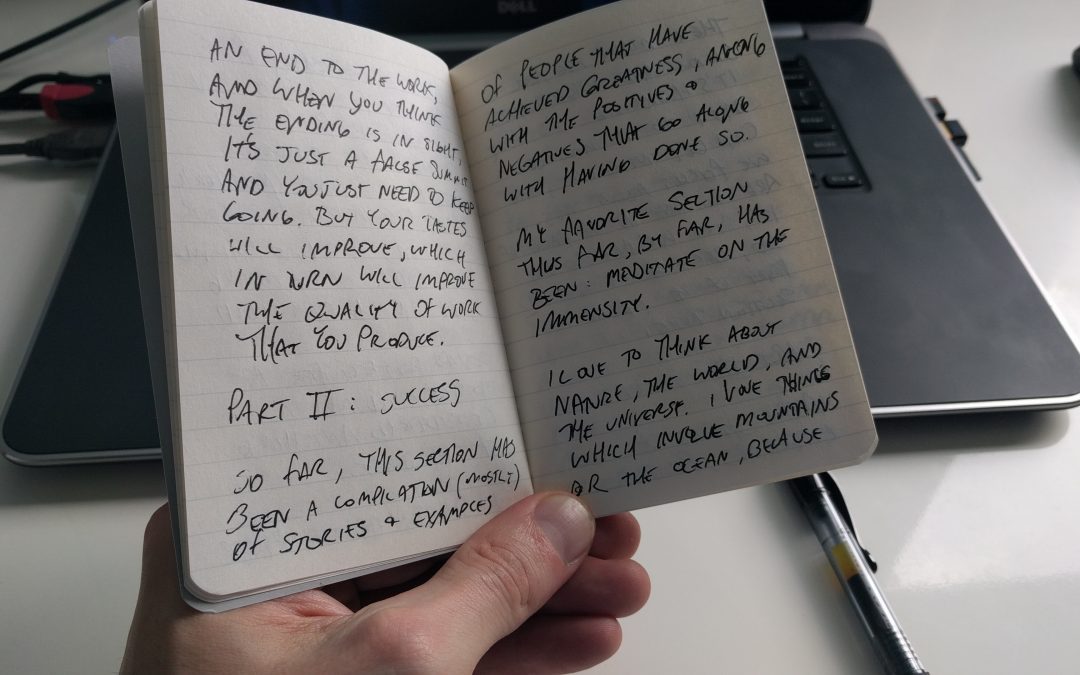Recently, I read Ryan Holiday’s new book Ego is the Enemy. As I went through each section, it had a lasting impact and I felt compelled to write down some of my thoughts.
The book contains three sections: Aspire, Success, and Failure.
Even before starting into the book, I’m comforted by the fact that, if anything, I will benefit from at least one of the three sections, if not all three.
I’ve definitely had plenty of experience in the failure department. (Ha!) Probably because I’ve long aspired to be something that I’ve yet to become, and I’m still very far from.
Part I: Aspire
The section starts off with the story of a military general, but already I’m thinking about decisions that I’ve made in the past, and whether or not an alternate decision, had I been able to remove myself or make the decision as an unbiased third person might have, would have resulted in a different (more favorable) outcome altogether.
What is the truth of the actions you take? What is the cause of the resistance? Pressfield’s The War of Art comes to mind.
Art is… well, it’s art. Sometimes making good art is terribly painful and almost never easy. Will you be, or will you do? How well is what you do aligned with who you are as a person? When you understand who you are and what motivates you with great clarity, making decisions that seem insurmountable can be made with relative ease.
Regardless of age, never stop being a student, as doing so will set the ego aside and keep you humble. Be your own teacher and critic, because it’s impossible to learn what one thinks one already knows.
I feel like I’ve always kept this approach. Be open to feedback – ask questions – be innately curious about people, places, things, the world in general. Never assume that you are the best at anything, or you will be left with a false sense of self-confidence.
And let us not be misguided by passion, of which the definition can be equally as preposterous as that of the word insanity.
Passion is form over function, whereas purpose is all function.
Holiday talks about the age old, timeless Canvas Strategy, where you non-subserviently pave the way for others on a similar path as yourself. You do the work, thereby reducing resistance, and in general make life easier for your superiors without taking credit or spending time in the spotlight.
In short, there’s never an end to the work, and just when you think the ending is in sight, it’s a false summit and you just need to keep going. But as you go along, your tastes will improve, which in turn will improve the quality of work that you produce.
Part II: Success
So far, this section has been a compilation (mostly) of stories & examples of people that have achieved greatness, along with the positives & negatives that go along with having done so.
My favorite part, thus far, by far, has been: meditate on the immensity.
I love to think about nature, the world, and the universe. I love doing things which involve mountains or the ocean, because they make me feel small & insignificant. It’s humbling. It’s easy to see how ego can get in the way, and it’s easy to forget about this. A quote was most appropriate here.
“When I look up in the universe, I know I’m small, but I’m also big. I’m big because I’m connected to the universe and the universe is connected to me.” -Neil deGrasse Tyson
Holiday, Ryan. Ego Is the Enemy (p. 140). Penguin Publishing Group. Kindle Edition.
I ended up reading this section twice.
Part III: Failure
More stories of emperors, political officials, military generals, and business figures. All demonstrate a point closely related to this – when life gives you lemons, how can you start a lemonade company? Life isn’t fair, and is often downright cruel. How will you react when faced with such adversity? Often a true beatdown, however unjust or unforgiving it may be, sometimes is absolutely necessary in order to see things as they really are and as they are meant to be seen. Unbiased, and nothing but the hard truth staring you in the face, in order to emerge and deal with the challenges of which you are faced, while maintaining an even keel, and unwaveringly staying the course for the duration. No matter how much pain is dealt to you, or how much time it takes to overcome.
Maintain virtues of excellence. Keep standards exceptionally high, though act as if this were normal and commonplace.
“Your potential, the absolute best you’re capable of— that’s the metric to measure yourself against. Your standards are. Winning is not enough. People can get lucky and win. People can be assholes and win. Anyone can win. But not everyone is the best possible version of themselves.” -Warren Buffett
Holiday, Ryan. Ego Is the Enemy (p. 197). Penguin Publishing Group. Kindle Edition.
This is worth repeating: everyone can win, but not everyone can be the best possible version of themselves.
I thoroughly enjoyed this book, and I’d go far as saying that it’s one of the best books I’ve read so far this year.
Have you read Ego is the enemy? What has been your favorite part of the book, or your favorite idea presented in the book? Elaborate your thoughts below in the comments.



There are no comments